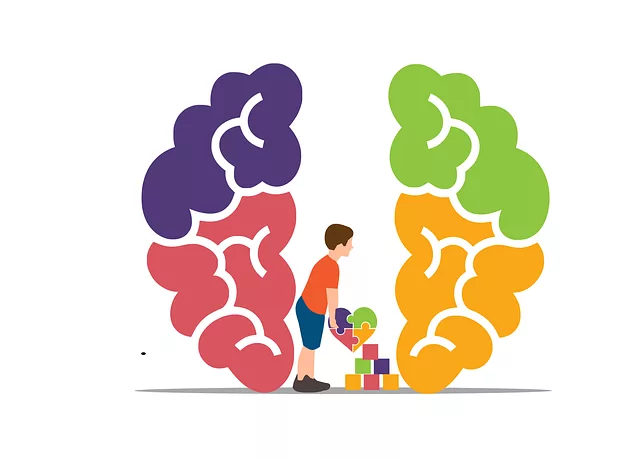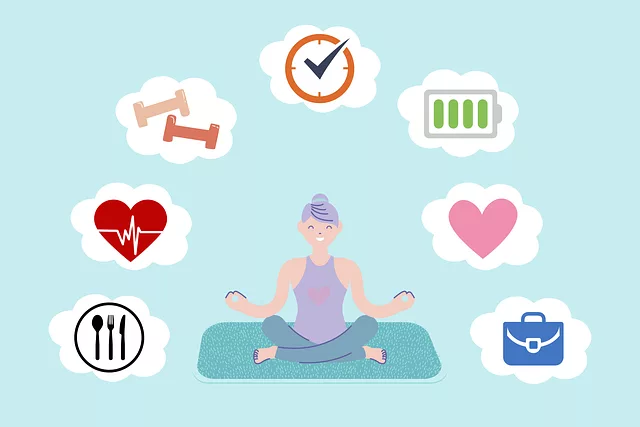Aurora Kaiser's innovative mental health classes provide tailored coaching for professionals navigating high-stress environments. These evidence-based programs, incorporating CBT and mindfulness, offer personalized support, stress management, conflict resolution, and emotional resilience through interactive discussions, mindfulness exercises, and practical tools. The immersive approach, combined with the Mental Wellness Podcast Series, equips individuals with effective coping mechanisms while addressing broader mental health policy initiatives. Kaiser's classes prioritize a supportive, inclusive environment with safety, diverse teaching methods, accessibility, empathy, and cultural competency training. Continuous improvement is driven by pre- and post-assessments, feedback sessions, and tracking KPIs for measurable success in areas like stress management, emotional regulation, and overall well-being.
Mental wellness coaching programs, such as the renowned Aurora Kaiser mental health classes, are gaining prominence as essential tools for promoting holistic well-being. This article explores the development and implementation of these transformative programs. We delve into understanding the growing need for accessible mental health support, designing engaging and effective sessions, integrating evidence-based practices, fostering supportive learning environments, and measuring their impact. By examining these key aspects, we highlight strategies to enhance mental wellness coaching and ensure its continuous improvement.
- Understanding the Need for Mental Wellness Coaching Programs
- Designing Effective Aurora Kaiser Mental Health Classes
- Incorporating Evidence-Based Practices in Coaching
- Creating a Supportive and Inclusive Learning Environment
- Measuring Success and Continuous Improvement Strategies
Understanding the Need for Mental Wellness Coaching Programs

In today’s fast-paced world, the importance of mental wellness cannot be overstated. As folks navigate a bustling landscape of daily demands and challenges, supporting their emotional health has become more critical than ever before. This need is particularly evident among professionals who, whether in healthcare, education, or other sectors, often face intense pressure and high-stress environments.
Aurora Kaiser’s mental health classes address this growing concern by offering tailored coaching programs designed to enhance resilience, boost confidence, and equip individuals with effective conflict resolution techniques. With an emphasis on personalized support, these classes go beyond traditional therapy to foster self-care practices that are essential for navigating life’s complexities. Moreover, they contribute to robust risk management planning for mental health professionals, ensuring they have the tools needed to maintain their own well-being while assisting others.
Designing Effective Aurora Kaiser Mental Health Classes

Aurora Kaiser mental health classes are designed to be immersive and impactful, combining evidence-based practices with engaging methodologies. These classes cater to a wide range of needs, from stress management and burnout prevention to enhancing social skills and fostering emotional resilience. The curriculum is meticulously crafted to create a supportive environment where participants can explore their mental wellness journeys at their own pace.
Effective Aurora Kaiser mental health classes often incorporate interactive discussions, mindfulness exercises, and practical tools that encourage self-reflection and personal growth. The Mental Wellness Podcast Series Production plays a crucial role in enhancing learning by providing supplementary resources and real-world examples. By integrating diverse teaching methods, these classes ensure that every learner is equipped with the knowledge and skills necessary to navigate life’s challenges with greater ease and confidence.
Incorporating Evidence-Based Practices in Coaching

Incorporating evidence-based practices is a cornerstone of effective mental wellness coaching programs, especially when guided by experts like Aurora Kaiser. These practices have been rigorously studied and proven to enhance various aspects of mental health. For instance, cognitive behavioral therapy (CBT), a common technique, aids in identifying and changing negative thought patterns, thereby reducing symptoms of anxiety and depression. Another powerful tool is mindfulness meditation, which has gained prominence in promoting resilience building and stress management. By integrating such evidence-based methods, coaching programs can offer structured support tailored to individual needs.
This approach aligns with broader mental health initiatives like Mental Health Policy Analysis and Advocacy, ensuring that the coaching goes beyond surface-level strategies. Additionally, focusing on stigma reduction efforts through open discussions and education during these sessions contributes to creating a more inclusive environment. The ultimate goal is to empower individuals with sustainable coping mechanisms, fostering improved mental well-being in a supportive setting.
Creating a Supportive and Inclusive Learning Environment

Creating a supportive and inclusive learning environment is paramount when developing mental wellness coaching programs, especially in the context of Aurora Kaiser’s mental health classes. This involves fostering a space where participants feel safe to express their experiences, fears, and hopes without fear of judgment. It means incorporating diverse teaching methods that cater to different learning styles, ensuring accessibility for all, regardless of physical or cognitive abilities. An inclusive classroom encourages active participation by valuing every voice, recognizing cultural differences, and promoting empathy among peers.
This environment extends beyond the physical space to encompass the interactions between coaches and clients. Building rapport based on respect, privacy, and confidentiality is essential. Coaches should be adept at tailoring their approach to meet individual needs while integrating evidence-based practices such as mindfulness, cognitive behavioral therapy techniques, and self-care strategies, including those that improve self-esteem. Additionally, healthcare provider cultural competency training ensures that coaches are equipped to address the unique mental health challenges faced by diverse populations.
Measuring Success and Continuous Improvement Strategies

Measuring success and implementing continuous improvement strategies are integral parts of developing effective mental wellness coaching programs, such as those offered by Aurora Kaiser. To gauge progress, coaches can employ various methods, including pre-and post-assessments to track client improvements in areas like stress management, emotional regulation, and overall well-being. Regular feedback sessions allow clients to share their experiences, highlighting what’s working and identifying potential challenges. This feedback is invaluable for refining coaching approaches and ensuring the program aligns with individual needs.
Additionally, tracking key performance indicators (KPIs) specific to mental health goals can provide a quantitative measure of success. These KPIs could include reduced symptoms of anxiety or depression, improved sleep quality, or enhanced ability to cope with stressful situations. By regularly reviewing these metrics, coaches can identify areas that require further attention and adapt their strategies accordingly. Embracing a culture of continuous improvement fosters innovation in coaching methods, ensuring the program remains relevant and effective in supporting clients’ mental wellness journeys, including those engaging in Aurora Kaiser’s mental health classes.
Mental wellness coaching programs, as exemplified by the successful implementation of Aurora Kaiser mental health classes, are crucial in promoting holistic well-being. By incorporating evidence-based practices and fostering supportive learning environments, these programs can significantly improve participants’ mental health outcomes. Continuous improvement strategies, based on measured success, ensure that such initiatives remain effective and relevant in addressing today’s psychological challenges. This comprehensive approach to mental wellness coaching holds the potential to revolutionize support systems, making them accessible and beneficial for all.






